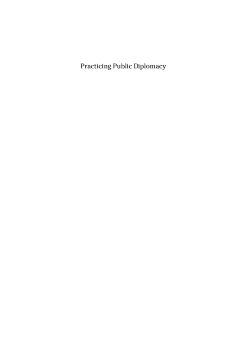
Additional Information
Book Details
Abstract
There is much discussion these days about public diplomacy—communicating directly with the people of other countries rather than through their diplomats—but little information about what it actually entails. This book does exactly that by detailing the doings of a US Foreign Service cultural officer in five hot spots of the Cold War - Germany, Laos, Poland, Austria, and the Soviet Union - as well as service in Washington DC with the State Department, the Helsinki Commission of the US Congress, and the National Endowment for Democracy. Part history, part memoir, it takes readers into the trenches of the Cold War and demonstrates what public diplomacy can do. It also provides examples of what could be done today in countries where anti-Americanism runs high.
Yale Richmond, a retired cultural officer in the US Foreign Service, practiced public diplomacy for thirty years, including postings abroad in Germany, Laos, Poland, Austria (Vienna), and the Soviet Union. A specialist in intercultural communication, his books have been translated and published in China and Korea.
“Richmond… played a significant role in the implementation of the Helsinki accords…[His] account of how this was done is useful and peppered with interesting personal details of what it was like to be involved in the day-to-day implementation of the accords. In this respect and others, Richmond has given us an authoritative report of how public diplomacy contributed to the outcome of the Cold War.” · Journal of Cold War Studies
“The volume is a useful guide for those who are currently or expecting to be practitioners of public diplomacy and Richmond’s experience, particularly in Poland and the former Soviet Union, perhaps provide the answers to how the U.S. State Department and its diplomats should confront the problems of global terrorism and anti-Americanism, especially in the Middle East. Or, as someone suggested, what really is needed is more Yale Richmonds.” · The Polish Review
“[Richmond] has already contributed a great deal to the history of US public diplomacy through his earlier studies on the practice of dialogue and exchange with the Soviet Union...[and] has now compiled his memoirs into a light-hearted but nonetheless highly engaging volume...[that is] not just an entertaining chronicle of the Cold War, but also a rich source of comment on issues that continue to plague US public diplomacy today.” · Journal of American History
“Richmond’s personal account of how public diplomacy was conducted during the Cold War gives the reader a practitioner’s perspective on this fascinating period in our history, and underscores public diplomacy’s continued importance in the conduct of U.S. foreign policy.” · USC Center on Public Diplomacy
“This short, readable volume is a treasure trove of sound advice wrapped in the recollections of one of America’s leading public diplomacy practitioners and top Soviet hands whose lengthy US government career spanned 44 years.” · WhirledView
“instructive book…[is] much more enlightening about down-to-earth public diplomacy than a training manual or abstract academic treatise can ever be…a delightful volume.” · AmericanDiplomacy.org
“This book will be a long-term reference source for researchers looking at Cold War history, as the subject goes through its inevitable revisionist cycles…It documents a critical element in U.S. cold-war relations––the effort to reach out ideologically to Soviet and East European audiences in the face of formidable opposition by Communist regimes in the region. The author was involved in this subject more directly and over a longer period of time than any other U.S. government official.” · Wilson Dizard, author of Inventing Public Diplomacy, and Member of the Public Diplomacy Council
"It is sometimes said that soft power helped to win the Cold War. To find out what it was like to be on the front lines of these battles, read this fascinating memoir." · Joseph S. Nye, Harvard University and author of Soft Power: The Means to Success in World Politics
